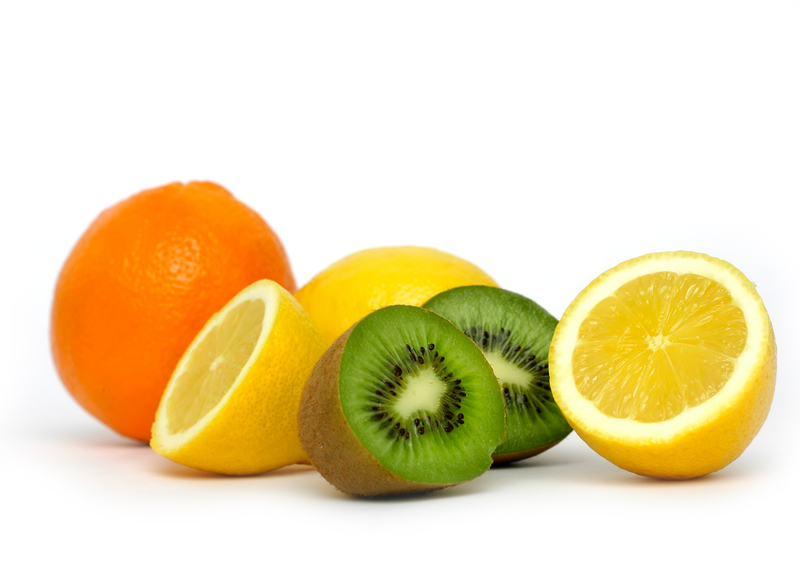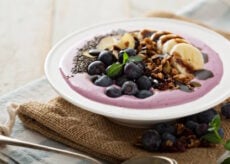10 Stress-Relieving Foods You Need in Your Diet

The body (and brain) is wired to deal with stress and can respond with increased energy, creativity, and well-being. It’s true! Not all stress is bad, and moderate and short-term doses of stress shouldn’t just be tolerated but welcomed and even invited. But when stress gets overwhelming or chronic, it can lead to issues—and over time, those issues can become serious. Fortunately, some stress-relieving foods can help shift the balance in our favor.
Good vs. Bad Stress
Stress is a part of life. (Thanks, Captain Obvious.) And in many ways, it’s beneficial. For instance, stress improves brain performance as it boosts connections of neurons in the brain, which promote memory and attention. 1 Acute stress is also designed to protect us from perceived threats and injury. Low to moderate amounts of short-term stress (including exercise) have even been found to boost the production of interleukins, which boost immune functioning to help protect against illnesses and promote wound healing. 2 (Chronic stress, unfortunately, has the opposite effect.)
One of the biggest benefits of stress is that it helps build resiliency. It pushes you to learn how to cope—and provides feedback that you can cope—even when times are tough. As you overcome problems, you learn how to better overcome them in future situations. This is vital as we all go through changes and transitions throughout life—including challenging and even painful ones. And how we navigate those changes (or stressors) can determine our future and well-being. 3
Of course, when stress becomes chronic or overwhelming and begins to dominate your thoughts, it can have a different, less positive (even detrimental) effect on your health. In fact, it can lead to anxiety or depression, lost sleep (and fatigue), weight gain, and health issues. In addition, increased stress levels can increase the need for certain nutrients, such as vitamin C, vitamin B, selenium, and magnesium. 4
Stress-Relieving Foods You Need in Your Diet
There are many ways to lower stress levels. For instance, sleep management is vital as is regular exercise. Quality self-care, such as breathing exercises, meditation, and spending time outdoors can also help manage stress levels. Another way to help ensure stress doesn’t become too overwhelming is by addressing your diet. For instance, vegetables and fruits have been found to help people become calmer, happier, and more energized. 5
Here are some of the best stress-relieving foods:
1. Green Leafy Vegetables
Green leafy vegetables like spinach, kale, and chard as they are a rich source of folate, a nutrient needed for the production of the calming, stress-relieving brain chemical dopamine.
Spinach, in particular, is rich in magnesium, which helps promote calmness, prevents blood pressure spikes, and lowers perceived levels of stress. It’s also rich in vitamin C and folic acid. 4
2. Avocado
Avocadoes don’t just make toast and taco Tuesdays better. They may also help fill up your belly, so you feel more satisfied after eating. This, in turn, can help you feel less stressed. What’s more, one study found that folks who added half an avocado to their lunches had less desire (40% less) to eat three hours later. 6
3. Blueberries
Blueberries provide a big dose of nutrients including antioxidants like vitamin C and phytonutrients. So, these small but powerful berries may support a healthy response to stress as well as fight the negative effects of free radicals. Blueberries are particularly well-known for their benefits to brain power, including memory. And they’ve also been found to help combat cortisol to help relieve stress. 4
4. Beets
Beets are another food that’s high in the stress-relieving nutrient folate. In fact, a one-cup serving can provide over 30% of your daily folate requirements. Folate is important for a healthy nervous system, and dietitians suggest consuming too little (or being depleted due, for example, to the use of cholesterol-lowering, anti-inflammatory, birth control, or diabetes medications) may increase mental fatigue, which can manifest in forgetfulness, confusion, and disrupted sleep. 7 Other foods high in folate include leafy greens and broccoli.
5. Oranges
Oranges and other foods that are high in vitamin C have been found to help support the body’s healthy response to stress. What’s more, they can support a healthy immune response, which, as mentioned above, can negatively impact immune functioning when prolonged or overwhelming. Foods rich in vitamin C may also help reduce levels of the “stress hormone” cortisol. In turn, high levels of cortisol can lead to fatigue, brain fog, and increased appetite and weight, specifically belly fat. 8
6. Fatty Fish
Salmon and other foods rich in omega-3 fatty acids (e.g., mackerel, tuna, and sardines) help support healthy levels of inflammation and may also help counteract the effects of stress hormones, including adrenaline and cortisol. One study, for example, found that a diet that was rich in omega-3 fatty acids helped decrease cortisol levels by up to 33% when compared to a placebo. 9
Fatty fish also provide stress fighters like vitamins B6 and B12, which are vital for brain functioning and help promote memory and improved mood. 4
7. Tryptophan-Rich Foods
Foods high in tryptophan like turkey, tuna, nuts, seeds, fish, lentils, oats, beans, eggs, milk, and tofu help the body produce serotonin. This hormone, in turn, helps control levels of hunger as well as happiness and well-being. Tryptophan may also help calm the body. One study found folks who consumed diets higher in this amino acid were less irritable, anxious, or depressed. 10
8. Probiotic-Rich Foods
Yogurt and other probiotic-rich foods like sauerkraut, kombucha, kimchi, tempeh, miso, pickles, some types of cheese (e.g., gouda and mozzarella), and pickles help promote a healthy microbiome. And the gut-brain connection is vital for managing stress levels. Stress, after all, can affect hunger and fullness. And while some people may stress eat, others can’t eat at all during stressful situations. So, providing the belly with healthy probiotics may help bust the stress cycle and promote greater well-being. 11
9. Seaweed
Sushi lovers rejoice! Seaweed is a food that’s rich in antioxidants and iodine, which may help relieve fatigue and depression and promote resilience to stress.
10. Dark Chocolate
Chocolate, especially dark chocolate that’s at least 70% cocoa, may or may not trigger feelings that mimic being in love. It does, however, appear to help relax blood vessels, which decreases blood pressure and improves the circulation of blood to help enhance well-being and lower perceived levels of stress. 12, 13 In addition, cocoa beans are high in theobromine, which may help boost blood flow and reduce blood pressure. And chocolate may also help elevate levels of serotonin and oleoylethanolamide, neurotransmitters that may help boost mood. 4
What you drink can also impact how well you respond to stress. First off, ensure you stay hydrated by drinking plenty of water. Soothing drinks to help calm you down include a warm cup of tea (especially lavender, chamomile, 14 or matcha). If you need a jolt of energy, a cup of coffee or green tea provides not only caffeine but flavonoids that may support memory, learning, and cognitive function. 4, 15
Stress-Relieving Foods: A Wrap-Up
When dealing with stressful times, it’s not just important to know what foods to eat but what foods to avoid. You may, for instance, be tempted to take it easy on your diet—after all, you already have enough to worry about. You may even find you stress eat (or eat emotionally) to try to ease stress. 16 Unfortunately, this has been shown to backfire. While these types of foods may provide a temporary sense of relief, they only compound your long-term stress levels. Foods you’ll want to limit include refined carbohydrates like cookies, chips, and crackers, which can increase blood sugar. The following blood sugar crash can lead to greater feelings of stress and anxiety.
So, if you are beginning to feel stressed or overwhelmed, choose stress-relieving foods that can instead help nourish your body and mind with nutrients to help you cope. And while you’re at it, take a nice, deep, cleansing breath, maybe get in a workout or a walk outside, and take other steps to release stress and build resilience.





 7 Signs Your Body is Seriously Low on Collagen (not just wrinkles)
7 Signs Your Body is Seriously Low on Collagen (not just wrinkles) Health Expert: "Turmeric Doesn't Work (unless...)"
Health Expert: "Turmeric Doesn't Work (unless...)" 3 Warning Signs Your Probiotic Supplement is a Total Waste
3 Warning Signs Your Probiotic Supplement is a Total Waste

